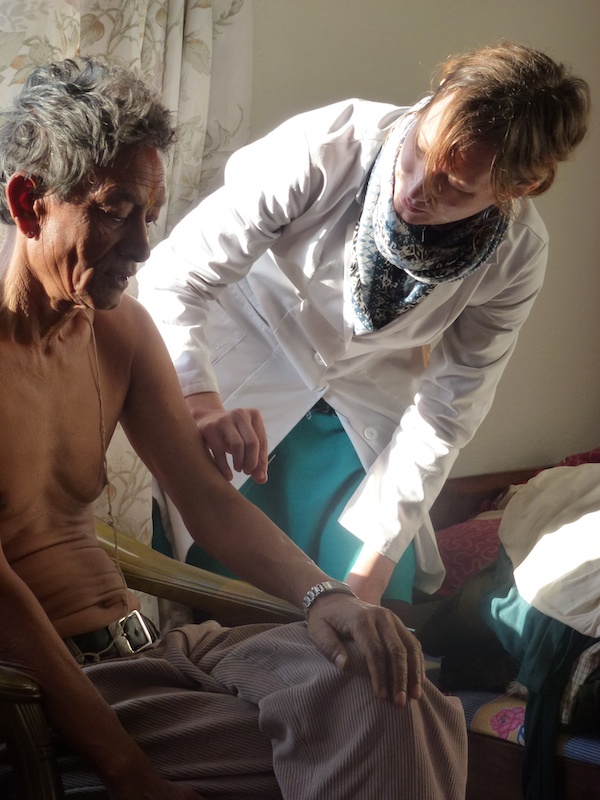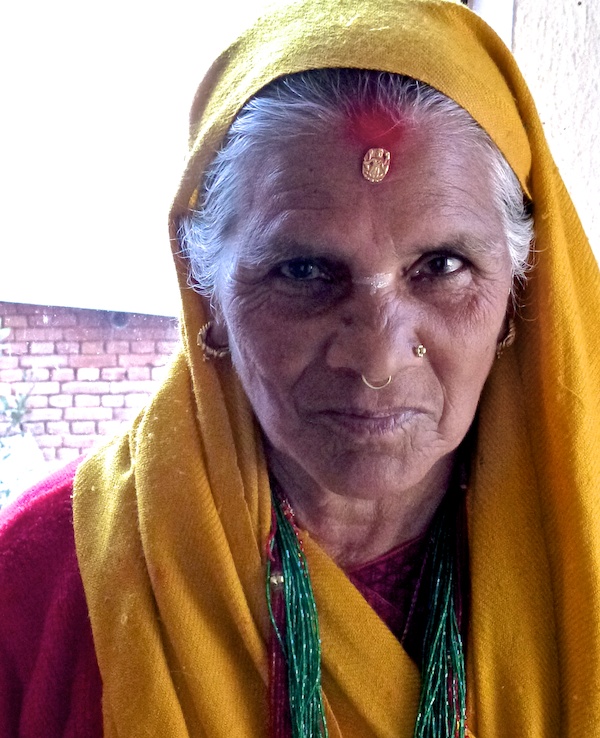
These past six weeks have been a whirlwind! Treating patients in Chapagaon, Godhavari, Champi, and Sipadol has been wonderful, challenging, gruelling, a test of patience, endurance, ingenuity, and yes, a test of using the art of language and communication. “But you have interpreters!” You say. And I agree. They are incredibly capable at what they do, and they make this operation go round. But the art of communication is a tough one, and as practitioners, part of our responsibility is to make the message we want to give to the patient communicable, and clear. However. This isn’t the end of the story. What happens when you must tell someone something that even in English is a challenge to say? This takes on a whole new level of skill, compassion, and of course, truth.
One of my regular patients has Parkinson’s disease. She has come in faithfully to the clinic, 4 and 5 days in a row, for six weeks straight, for acupuncture. On the first visit she was told that her hand and facial tremors could perhaps be decreased by regular treatments, but that they would never completely go away. However, throughout the entire duration of her coming to the clinic she has been anxious to have her disease ‘cured’ so that she can return to her village. In almost every intake her reply to “how are you doing today” is some kind of wry answer like “well, I’m still shaking” or “look at me. How do you think I am?” But her commitment to stay in Chapagaon, live with her son, daughter-in-law, and grandson, and make the trek to the clinic on foot on a daily basis is strong. Because she has believed that she will, in fact, be cured.
As a new medical practitioner, and one who hasn’t dealt yet with terminal and permanent illness to a great degree, I am discovering that the line between contributing to a sense of hope for a patient, and giving them the honest, hard truth is a fine one. Add to that a culture of people who haven’t heard the terms ‘Parkinson’s’ and ‘Alzheimer’s’ and the tendency is very attractive to keep a patient in ignorant bliss, thinking that if they come in every day (or as instructed) to get their treatments, that they will someday be free of their afflictions and life will go back to the way it was. I am sure this is a common feeling underlying all practices of medicine. We all want to breed hope. But if the truth underlies the hope, and the level of wellbeing and awareness of a patient as to his or her condition is under threat due to dishonesty, then what we have as primary care practitioners (as we acupuncturists are considered here in Nepal), then we have a tremendous responsibility. And it isn’t our responsibility to give diagnostic news to our patients in the US, so. Here comes a grand opportunity.
And so, a few treatments in, it started to become apparent that nobody had yet given her the news, the honest truth, about her disease(or so I thought. I later learned that it had not been explained with clarity, nor had the patient or the family assimilated, either through lack of understanding or perhaps acceptance, the information that her disease was progressive, and without cure) . So I asked. “Has anyone ever talked to you about Parkinson’s disease?” she and her daughter-in-law looking back at me with a blankness that whispered, “they have no idea.” And so, in one moment, it became my responsibility to tell her about her disease and its implications for her life.

The beauty, and irony, of this moment, is that it was inextricably linked in my mind to my father. I stole the title of this blog from him, from his book about communication and the deliverance of news in a clinical setting, written in sociological, ethnomethodological, conversation analysis language and code. I hope he doesn’t file for copyright...! But in all seriousness, I knew that this very moment in my life was a moment that my father has dedicated years of study and passion to understanding. As I explained what Parkinson’s disease is to the patient and her family member (mind you, this is also in a room full of other patients, and hardly a private space), split-second thoughts ran through my head. Am I doing a good job? Am I saying enough? Am I delivering this news in the best possible way, showing honesty, clarity, and of course, compassion? And I hope to whatever I can hope to that I am doing it well. Partly to honor the studies that my father has done, but most importantly for this patient, for her hopes, her life, and for her understanding of what is happening to her body.
She seemed to understand, albeit with a stubbornness that I could sense, both she and her daughter-in-law listening and silently passing a moment to process the news that her condition is ‘irreversible’. They showed no signs of having heard this news before. I delved into explaining simple idiopathy, and suggested that she, the patient, could elect to continue treatment with acupuncture, seek allopathic care and pharmaceutical therapy, or both. Ultimately, it was up to her. When all the needles had been taken out, she stated that if I cured her illness, she would give me a prize. I believe that I was as clear as possible, but the hope of the human heart is astounding. And in some ways, who knows. Miracles happen.
As it turned out, she in fact had been to see a western doctor, and also had been prescribed Levodopa. She returned to the clinic following our discourse with records from the hospital, stating her condition as Parkinsonian. It was now revealed to me that she had taken pharmaceuticals, went off of them, and decided to try another course by putting her sole efforts to return to health into treatments at our clinic. The interesting thing is, if she has records stating her disease, and medications to potentially help alleviate the symptoms, how could she and her family not know what is happening to her?
It has become readily evident that communication in the hospitals and clinics here is scanty, if not absent. In Nepal, we as Chinese medicine practitioners are considered on par with allopathic care. Our opinions matter equally to patients, and the faith given to our medicine is perhaps as much or beyond that given to the Western form of medicine. Working at the clinic we consistently see patients on medications who have no idea what their medications are for (not always the case, to be clear, but enough of the case to note). Surely there is a mix of educated (doctors) vs uneducated (patients), and a communication gap that occurs due to many factors that exist in the interplay of the two sides. Over the course of treating in our clinic, it appears as well that the communication that we are providing to the patients goes above and beyond what they are getting from allopathic doctors, and also surpasses patients’ expectations.
The interesting thing is that the first day that I told my patient about her illness wasn’t the last. She and her daughter-in-law at various times have continued to ask about the possibility of cure. So I’ve gotten to practice delivering a compassionate and truthful message a few times over! Progressive, irreversible, brain, nervous system, acupuncture may help, no guarantees, the most important thing is for you to be happy...these are the nuts and bolts. When I am not at the main clinic they have asked other practitioners, as if they may tell them what they want to hear. They get the same answer... One day my patient with Parkinson’s told me that she liked me very much. This was such beautiful news, as her moods are variable, and sometimes, honestly I just can’t tell.
Working with her over these weeks has been beautiful, and tough. Her symptoms do improve sometimes, which is incredibly encouraging. But they also go in waves. Although her symptoms do fluctuate, both in what she states, and in what can be observed, the most remarkable thing is her personal aspect. She is smiling much more, her eyes are brighter, she is quite a bit more chatty. She even cracks jokes, a dry sense of humor that makes others in the room laugh. Another practitioner described her as “glowing” just the other day. She has, what we call in Chinese Medicine, Shen. Her Shen is bright. I can tell she has done much in her life, and cared deeply for her family, for whom she has taken care until she began to lose her dexterity, her clarity of speech, and with it, her identity. A few weeks in, she began walking to the clinic by herself on a daily basis. She would announce it as she sat down, “I came by myself today”. She had a gleam in her eye and a shining smile under her hesitancy to show it. --- Jessica Maynard











